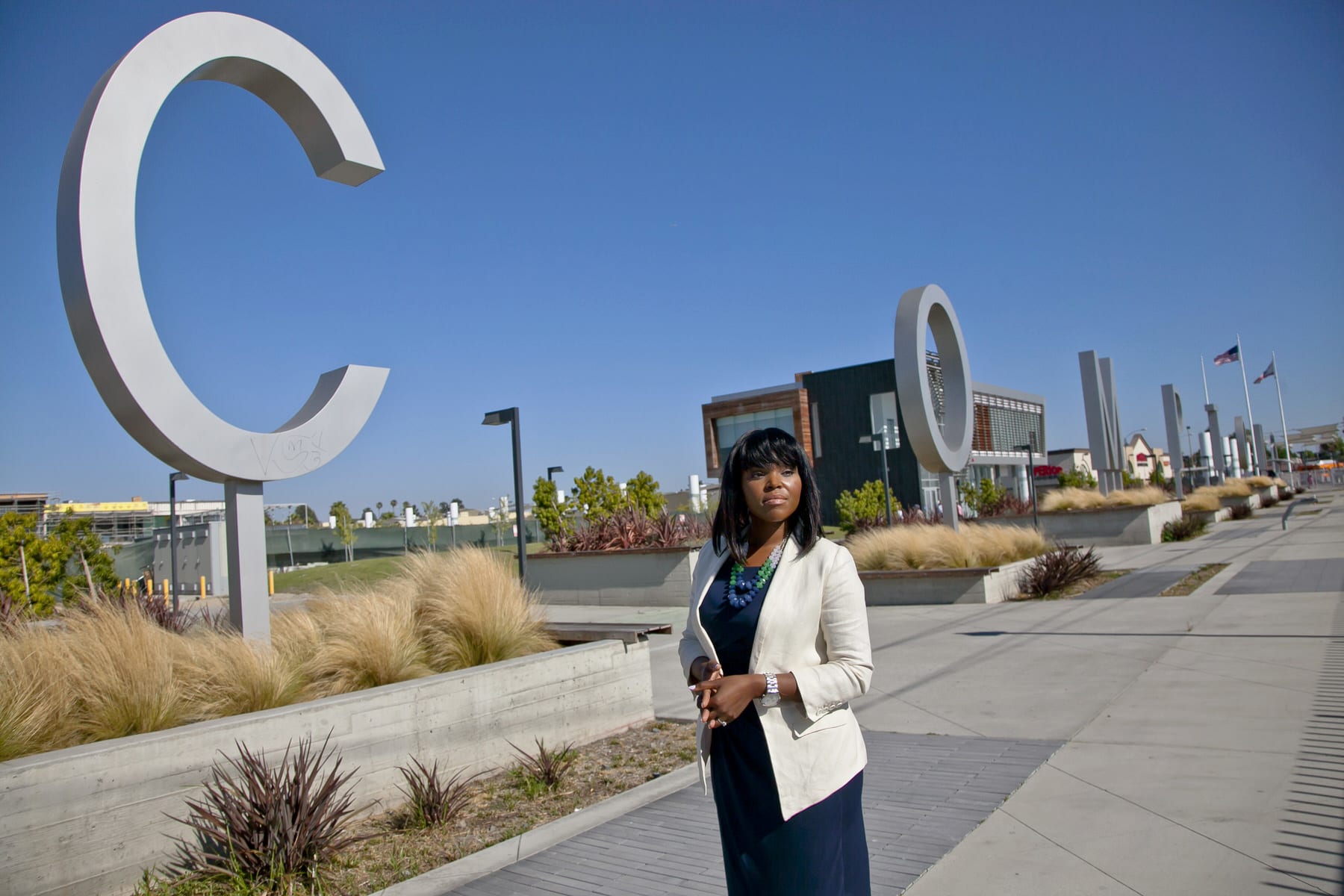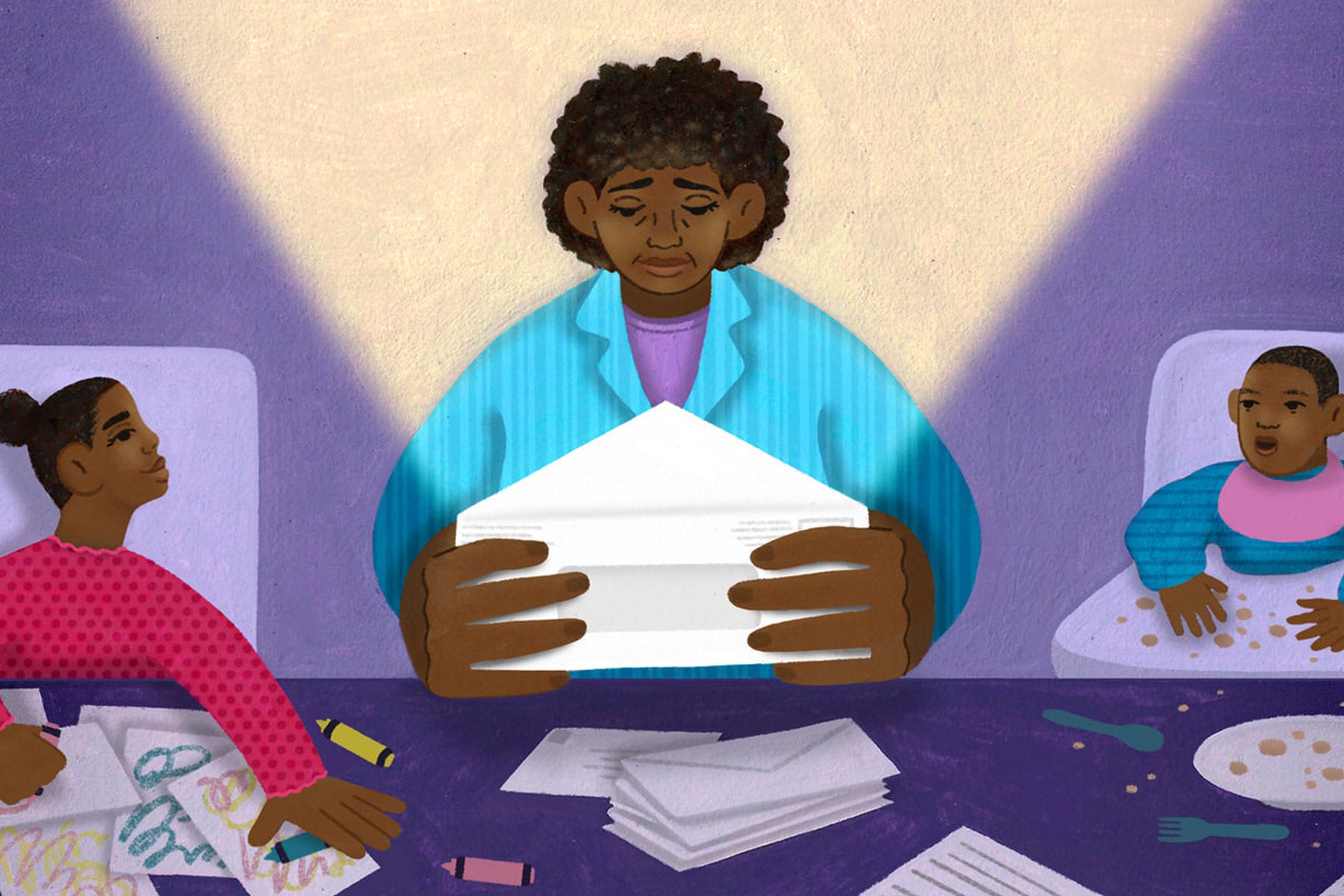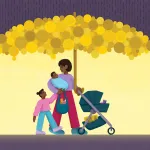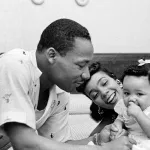It feels overwhelming to her when she lists it out. She’s a single mom with four kids — a 6-year-old, a 2-year-old and 3-year-old twins. Three have asthma and she has chronic bronchitis, so the virus has threatened them all year.
Work, when she had it, was no escape. The people she cared for in the nursing home were the most vulnerable. It was difficult, she said, to go to work and watch people die.
The virus also closed the day cares where she sent her children, and work soon became untenable. She left her job. It wasn’t even a decision, really. What decision do you have when you don’t have anyone to watch your kids? When you don’t have nearby family? When you don’t get child support?
Brandy Nichols, 25, “probably wouldn’t have been able to have made it this far,” she said, without help. The government aid programs available to her — food stamps and Section 8 housing — alleviated her problems somewhat, but her biggest problem was income. Even when she had it, it wasn’t enough.
Then in early 2020, Nichols was chosen to participate in one of the country’s guaranteed income pilot programs. The idea is simple: small monthly payments to low-income people, no questions asked. Nichols got access to it at just the right time, when the worst economic nosedive in generations thrust millions of workers — most of them women of color — into unemployment early last year.
Now, the pandemic has accelerated interest in federal guaranteed income programs. Over the summer, a coalition of 42 mayors from places like Atlanta, Pittsburgh, Philadelphia, Los Angeles and New Orleans convened to advocate for pilot programs in their cities. Several other cities — including Compton and Stockton, California, and Jackson, Mississippi, where Nichols lives — have already launched programs. On the funding side, major philanthropists have invested heavily. The Economic Security Project — co-chaired by Facebook co-founder Chris Hughes — has committed more than $10 million in grants to places that set up pilots. In December, Twitter CEO Jack Dorsey committed $15 million to the organization Mayors for a Guaranteed Income.
Americans may be more familiar with universal basic income, a model popularized by former presidential candidate Andrew Yang, who largely campaigned on a proposal to give $1,000 monthly checks to every American adult. But guaranteed income is more targeted. Most of the programs being tested offer small monthly payments, in the hundreds or up to $1,000, for a specific period of time. And who can access them is limited, with most programs aimed at lowest-income families. Oftentimes, that’s women.
About 56 percent of the people who live in poverty in the United States are women, and most of those are women of color. Of that group, unmarried women with children, like Nichols, are the most likely to be below the federal poverty line. For her family of five, that was $30,680 in 2020.
The pandemic has only deepened that crisis. At its worst point, in May, one in six Black women were out of work. An estimated 1.6 million mothers left their jobs in just September specifically to care for children, according to one economist’s estimate.
During the pandemic, the idea of the federal government sending direct payments to people also became normalized under the guise of stimulus money. Stimulus checks, which may soon get sent a third time, have proved, at least, that a program on a national scale could be possible. They’ve also shifted public opinion on what was once considered a fringe topic — though it is a centuries-old idea once touted by Martin Luther King Jr. — and made it more mainstream.
Proponents of guaranteed income programs are hoping to amass data on the implementation and feasibility of these initiatives in order to build support for a national plan that would supplement the existing social safety net but not replace current welfare programs.
We don’t need this to be a moment. We need this to be a movement
Aisha Nyandoro, executive director of Magnolia Mother’s Trust
A recent study in Finland has lent some credence to the idea that a national program could work. The Finnish study found that small monthly payments didn’t disincentivize work and that people who participated reported improved wellbeing.
The pilot program that helped Nichols, Magnolia Mother’s Trust in Jackson, is one of several that is hoping to build the case for a larger-scale plan that expressly addresses the systemic racism that keeps people in poverty. Magnolia offers $1,000 monthly payments for Black mothers for a year. The program launched in December 2018 with 20 mothers and is now in its second year, covering 110 mothers.
Aisha Nyandoro, the executive director of Magnolia, said it was built as a response to what single mothers in the area said they really needed.
“When we asked, ‘What are we missing, what do you need to live your life?’ They were like, ‘We need money,’” Nyandoro said. When Magnolia started, only a small number of people were trying guaranteed income. No more.
“It took us a pandemic to get here. It took an economic downfall to get here,” she said. “Sometimes, we need hard lessons.”
In his 1967 book, “Where Do We Go From Here: Chaos or Community?” Martin Luther King Jr. laid out what he felt was the answer to the welfare programs that sought “to solve poverty by first solving something else.”
If done correctly, a guaranteed, no-strings-attached income could address the bigger problems in housing and education, he posited, while also producing psychological benefits.
“The dignity of the individual will flourish when the decisions concerning his life are in his own hands, when he has the assurance that his income is stable and certain, and when he knows that he has the means to seek self-improvement,” King wrote.
Since welfare reform legislation passed in 1996, the U.S. approach has been based on encouraging marriage, two-parent households and work through a work requirement for accessing benefits. Backers say that approach creates better outcomes for those in the system, but critics say it fails to address the realities of working families and the structural barriers for families of color.
Robert Rector, a senior research fellow at the conservative Heritage Foundation and one of the authors of the 1996 law, said part of its goal was to try to limit burdens on single parents by encouraging families to stay together.
“What you want to do with any assistance that you’re giving is you want to support physical need. But you also want to promote work, you want to promote marriage, and you want to promote what I call social or psychological well being,” Rector said.
But access to welfare programs varies widely by state, with Black families reporting the least access to some benefits. The application process can be burdensome, and the stigma can be real, especially for Black women who are battling the racist trope of the “welfare queen.”
“The narrative was that you’re irresponsible with your money and therefore these programs need to work really hard to catch cheaters and they need to have a really high burden of proof,” said Dr. Zea Malawa, the director of another group in San Francisco that is testing guaranteed income for mothers of color. “All of that robs people of their dignity.”
Black women have long had the highest labor force participation rate in the country. At the start of the pandemic, 63 percent of Black women were working, compared with 58 percent of White women. But Black women are also among the most likely to be unemployed now because of the occupational segregation that relegated many to low-paying care and hospitality positions. In December, the unemployment rate for Black women was still at 8.5 percent, while it had dropped to 5.1 percent for White women.
King’s directive and the idea of dignity resonated years later with Compton Mayor Aja Brown, who is part of the group of mayors piloting guaranteed income. Compton’s program, known as the Compton Pledge, kicked off this year, targeting 800 residents with $300 to $600 monthly payments for two years. It’s one of the most expansive guaranteed income trials in terms of recipients in the country, with several built-in parameters to ensure equity. It’s designed to take on residents who are representative of Compton’s diversity — the city is 68 percent Latinx and 30 percent Black — and skews toward serving those who are unbanked, formerly incarcerated and undocumented, the population least likely to get aid. Brown also expects to serve women disproportionately.
“We fully recognize that lifting women out of poverty lifts their entire families,” Brown said.

“My mother worked every day of my life, and she was a hard worker, made sacrifices, no excuses,” said Brown, who was raised with her twin brother by her single mother, an administrative assistant at a jet propulsion laboratory. “People that are in poverty are not lazy. They work extremely hard — many times having two or three jobs just to be able to afford basic necessities. Guaranteed income would have transformed not only my mother’s life but even my life.”
The payments, Brown said, were enough to make a difference, but wouldn’t stop someone from seeking work.
In pilots so far, there’s been little evidence that guaranteed income payments disincentivize work. Data from the first year of the Magnolia Mother’s Trust found that the percentage of participants who were able to pay bills without additional support rose from 37 percent to 80 percent.
“People, regardless of their economic status, have a desire to grow and do better than their parents did,” Brown said. “A stipend — whether it’s $600 or $1,000 — is not going to take the hope and dream and the motivation for people to strive to be more and to live better.”
Malawa’s Abundant Birth Project in San Francisco also cites financial freedom and dignity to spend money how it is needed as a draw to guaranteed income.
The project, led by racial equity collective Expecting Justice, will provide $1,000-a-month payments to 150 Black and Pacific Islander mothers through their pregnancy and six months after childbirth. Preterm births are correlated with poor health outcomes, and in San Francisco, Black babies are almost twice as likely as White babies to be born early; Pacific Islanders see a preterm birth rate of more than 10 percent — three times higher than the national rate for Asian and Pacific Islanders.
The group wanted to address the causes of preterm births to try to prevent them, said Malawa, who is also a pediatrician.
“The beauty of cash is that we can respect that Black and Pacific Islander mommas are not a monolith,” she said. “We can give them the dignity of deciding how they themselves want to address the financial stress as opposed to us deciding for them in a very paternalistic way what should get paid for and how we are going to pay for it, which is what a lot of our benefits programs look like.”
The pandemic is, at least, creating a space for a conversation about what shape aid can take after it’s once again become clear that people of color are most likely to get stuck in the cycle of poverty.
The idea of guaranteed income has gotten more high-profile interest. Vice President Kamala Harris proposed during her campaign to send cash payments to middle-income families of up to $500 a month. President Joe Biden has at least considered it, speaking to Yang’s nonprofit, Humanity Forward, about the topic of recurring payments late last year. And a new movement led by Girls Who Code founder and CEO Reshma Saujani is calling for a Marshall Plan for Moms, asking for guaranteed payments to mothers at least in the short term to help cover basic needs with many schools and day cares closed or open on less reliable schedules. The group, backed by #MeToo founder Tarana Burke and actor Eva Longoria, recently published a letter to Biden pushing for the plan in a full-page ad in The New York Times.
Nydandoro, who was one of the first to set up a program with Magnolias, said the emergence of more guaranteed income pilots will help groups like hers make the case at the federal level and provide proof of concept.
“We’re changing the narrative of how we go about addressing poverty,” Nyandoro said. “Narrative is so important, and we don’t have those conversations enough about the role that narrative plays in our policies. We don’t know each other and so if we don’t know each other, we hold on to these narratives that are damaging and ill-informed.”
An administration that is friendly to the topic is a welcome sign for her. But as someone who has been working in the space of guaranteed income for years, Nyandoro is wary of whether perception has changed enough to really push the idea further.
The pandemic made the idea trendy, she said, and she worries people will then move on. “We don’t need this to be a moment,” she said. “We need this to be a movement.”
Because ultimately, the programs that cities and nonprofits are piloting will expire, and a long-term solution is not yet in place.
Nichols said she could not be more grateful for the Magnolia program, which helped her at a time of crisis. But she is now in her last month of payments, and so far the money has gone to her most immediate needs: keeping her car running, paying rent, buying clothes for her children. She’s applied to jobs, but the pandemic has made day care schedules unreliable, and work schedules don’t always cooperate.
“You believe in your heart that you’re going to be able to work those hours. But that may not always work,” Nichols said. “Sometimes I work a little bit outside of my city — I might work in another city from where I live. But gas has always been an issue.”
It’s a cycle that feels oppressive, she says on the phone, her battery at 1 percent, her kids asking to speak with her.
“I’m alone, I’m alone, I’m alone raising them,” she said. “I try, I try I try, but even though I know I can’t work like I want to, I still keep trying.”
She’s wondering what other help there could be for her. But the call drops before she can finish explaining.





